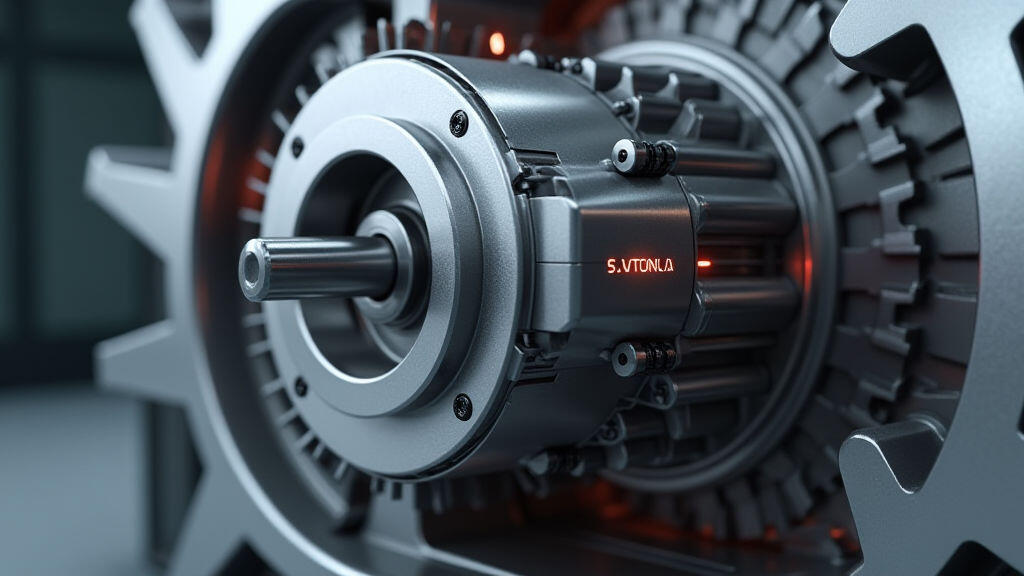Innovative Application Trends of New-Generation Understanding of Gear Motors and Their Applications in Food Processing
The food processing industry is undergoing a rapid transformation, driven by increasing consumer demand for higher quality, safer, and more sustainable products. This evolution is intertwined with advancements in automation, precision, and efficiency. At the heart of many modern food processing operations lie gear motors, the workhorses of countless equipment, from conveyors and mixers to packaging machines and robotic arms. This article explores the innovative application trends leveraging new-generation understanding of gear motors and their transformative impact on the food processing landscape, incorporating considerations of current industry trends like Industry 4.0, AI-driven optimization, and the push for sustainability. We will specifically highlight how MES-Drive is leading the way in this revolution.
The Evolution of Gear Motors: Beyond Basic Power Transmission
Traditional gear motors have long been employed in food processing. However, recent breakthroughs in motor technology, materials science, and control systems are ushering in a new era of performance. These new-generation gear motors offer several key advantages:
- Higher Efficiency: Modern designs incorporate advanced gear geometries (e.g., helical, planetary) and optimized lubrication systems, significantly reducing energy loss and operational costs. Manufacturers are focusing on IE4 and IE5 energy efficiency standards.
- Increased Precision: Precise gear tooth manufacturing (often utilizing advanced CNC machining) results in smoother, quieter operation with reduced backlash. This is crucial for applications requiring accurate positioning and controlled movements, such as dispensing and portioning.
- Compact Design: Advances in materials (e.g., lightweight alloys) and miniaturization techniques are enabling more compact gear motor designs, allowing for integration into space-constrained equipment.
- Smart Integration: The integration of sensors and communication capabilities (e.g., IoT connectivity) is enabling real-time monitoring, diagnostics, and predictive maintenance, minimizing downtime and optimizing performance. This is a cornerstone of Industry 4.0 principles.
- Enhanced Hygiene: Food processing demands stringent hygiene standards. New gear motor designs are incorporating features like stainless steel construction, smooth surfaces, and sealed enclosures to prevent contamination and facilitate cleaning.

Key Application Trends in Food Processing
The improved capabilities of new-generation gear motors are impacting a broad spectrum of food processing applications. Some notable trends include:
1. Advanced Conveyor Systems: Food processing relies heavily on efficient and reliable conveyor systems. Gear motors are the driving force behind these systems, and new-generation motors are enabling more sophisticated designs. This includes:
- Variable Speed Control: Precise control over conveyor speed allows for customized processing parameters for different food products.
- Modular Conveyors: Gear motors are integral to modular conveyor systems that can be easily reconfigured to adapt to changing production needs.
- Smart Conveyors: Integrating sensors and IoT connectivity into conveyors powered by upgraded gear motors allows for real-time monitoring of product flow, temperature, and potential bottlenecks. This enables proactive adjustments to optimize efficiency and prevent product spoilage.
2. Precision Mixing and Blending: Achieving consistent product quality requires precise mixing and blending. New-generation gear motors are critical for these processes:
- High Torque-to-Weight Ratio: These motors provide the necessary torque to handle viscous food products while remaining lightweight, contributing to overall equipment efficiency.
- Backlash Reduction: Minimizing backlash ensures consistent mixing patterns, preventing inconsistencies in product texture and quality.
- Direct Drive Systems: Eliminating intermediate transmission components (e.g., belts and pulleys) with direct drive gear motors reduces energy loss and improves precision.
3. Automated Packaging and Filling: The packaging industry is increasingly automated, with gear motors playing a vital role in filling, sealing, and labeling operations.
- High-Speed Packaging: Efficient gear motors enable high-speed packaging lines, minimizing production time and maximizing throughput.
- Accurate Filling: Precise motor control ensures accurate filling of containers, reducing product waste and minimizing loss of valuable ingredients.
- Robotic Integration: Gear motors power the robotic arms used in automated packaging lines, enabling flexible and adaptable packaging solutions.
4. Robotics and Food Handling: Robotics is rapidly transforming food processing, and gear motors are essential for equipping robots with the necessary strength, precision, and agility.
- Collaborative Robots (Cobots): Gear motors allow cobots to perform tasks alongside human workers, enhancing productivity and improving workplace safety.
- Articulated Robots: Integrated into articulated robotic arms, gear motors enable precise and multi-axis movements necessary for tasks like sorting, inspection, and delicate handling of food products.
- End-of-Arm Tooling (EOAT): Gear motors provide the power and control required for EOAT systems that grip and manipulate food products.
The Role of MES-Drive in Driving Innovation
MES-Drive is a leading provider of advanced gear motor solutions for the food processing industry. The company's innovative approach focuses on:
- Customized Designs: MES-Drive offers customized gear motor designs tailored to specific application requirements, ensuring optimal performance and efficiency.
- Smart Motor Technology: MES-Drive integrates sensors, communication capabilities, and advanced control algorithms into its gear motors, enabling real-time monitoring, diagnostics, and predictive maintenance.
- Sustainable Solutions: MES-Drive is committed to developing energy-efficient gear motors that reduce environmental impact and lower operating costs. They are actively working on using more sustainable materials.
- Industry 4.0 Integration: MES-Drive gear motors are designed to seamlessly integrate with existing and emerging Industry 4.0 systems, enabling data-driven optimization of food processing operations.

Conclusion: Powering the Future of Food Processing
New-generation gear motors are revolutionizing the food processing industry, enabling greater efficiency, precision, and safety. The trend towards Industry 4.0, coupled with the demand for sustainable practices, is driving the adoption of smart, energy-efficient gear motor solutions. MES-Drive is at the forefront of this transformation, offering customized designs, smart technologies, and sustainable solutions that empower food processors to meet the evolving challenges of the market. As food processing continues to become more automated and data-driven, the role of advanced gear motors, particularly those offered by companies like MES-Drive, will only become more critical. The ability to predict maintenance needs, optimize processes in real-time, and reduce energy consumption will be key to maintaining competitiveness and achieving long-term success in this dynamic industry – and new-generation gear motors are providing the power to do just that.



Leave A Reply
Your email address will not be published. Required fiels are marked